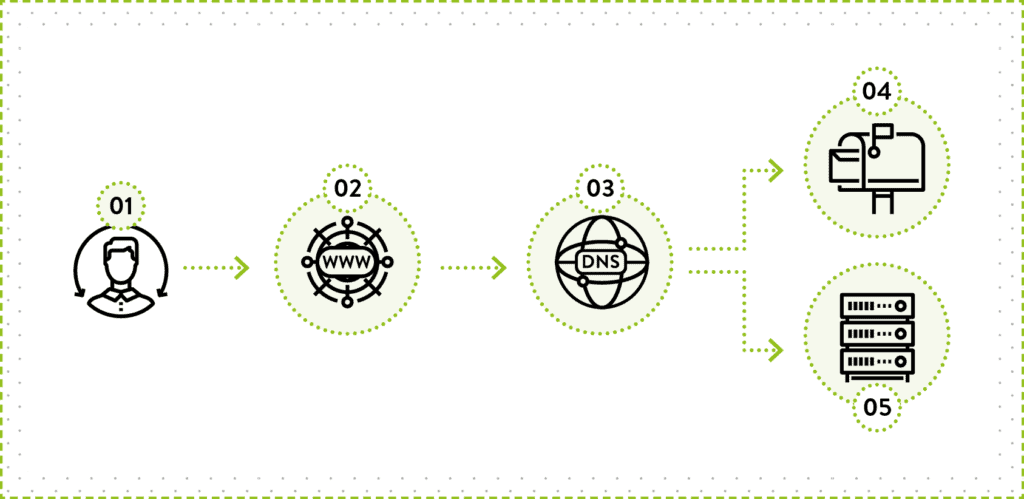What Is A DNS And What Role Do They Play For Your Website?
There are a lot of acronyms and jargon in the web development industry. This post looks at what a DNS is, and why it’s important for fast and secure websites.

Oops! We could not locate your form.
There are a lot of acronyms and jargon in the web development industry. This post looks at what a DNS is, and why it’s important for fast and secure websites.

The first thing when migrating a website or pushing a new one live involves directing your domain name to your host server. The direction is managed by a DNS resolver. Most domain name registrars include this service as part of the domain registration. However, propagation times (the time waiting to visually see updates) can be slow and in some cases, you can be left waiting up to 72 hours to see your changes take effect.
A premium DNS provider is a dedicated service for making faster and more secure updates. If you’re pushing important updates and want faster propagation times, investing in a premium DNS provider can be the answer.
Lots of people ask this question, The confusion is understandable as the DNS is closely related to the domain name. DNS even stands for Domain Name System. They are NOT the same thing though.
A domain name is a human-friendly address identifier given to a website, for example, impactmedia.co.uk. But networks and connected devices use numerical addresses to locate and connect with each other. These numerical IP addresses don’t trip quite so easily off the tongue for us organic lifeforms.
A DNS on the other hand relates to a server or service that controls where to point a user once they hit the domain name. It associates and translates the domain name to its numerical IP address, enabling it to be found and connected to, wherever it lives on the web.
A DNS has various records associated with it, the most popular being A records and MX records.
An A record connects to a web server, allowing website visitors to begin viewing content, whereas an MX record connects to an email server, to send and receive email using a domain name.
A DNS or Domain Name System is like a phone book of the web. It stores records and connects domain names like www.impactmedia.co.uk to IP addresses to make it easier for users to connect to websites or services. Similar to a number plate on a car. A plate is easier to remember than a car’s VIN number. Domains are easier to remember than IP Addresses.

For new businesses or recently purchased domain names the DNS is usually managed via the domain name registrar control panel. This is where the records can be updated to direct traffic to your website server or email server.
It will also be the first place to make the initial change if using a premium DNS, or where your IT department or provider will update the records.
Your internal IT department or IT solutions partner may manage your DNS. This might be to obtain control for security reasons, or because it’s simply easier for liaising with third parties when creating and managing email accounts, something that they would be typically responsible for.
Your DNS might also be managed by your website agency. They will liaise with your IT team on updating settings related to email records, but anything website related to the DNS would likely be managed by the agency solely.
Impact prefers this approach, as web changes are likely to occur more frequently than email. So having control here means there we are not waiting for partners to respond in order to push updates.
As briefly touched upon above, a premium DNS service allows for faster and more secure updates and website pushes. It removes the potential lengthy waiting for propagation.
On top of this, they offer a lot of other benefits that free DNS providers don’t.
Performance and fast websites are a big deal for all manner of reasons, especially for user experience. A premium DNS gets users to your website faster, reducing latency. They also provide greater DNS resolution uptime for consistent and reliable performance.
Much like with CDN services, premium DNS providers tend to have instances in various locations to better serve users worldwide.
This means that those accessing your website are far less likely to experience slow connectivity and connection errors.
Aside from the speed and uptime reliability benefits, their infrastructure is far more secure and can mitigate large attacks, whilst delivering safer, cleaner traffic to your website.
A DNS server can be targeted for attacks known as DNS hijacks, DNS Spoofing, or a Machine In The Middle (MITM) attack. Instead of visiting your intended destination, you can be redirected to a malicious website, or have your data harvested. A DNS server can also be used to mount larger DDoS attacks on other websites.
To protect your website and your users, ensuring that your DNS service has the highest level of protection is of great importance, and why we advise using a premium DNS provider.
Most premium DNS providers employ technologies and advanced features like Domain Name Security Extensions (DNSSEC) which help to secure the lookup process, preventing malicious intervention or hijacking, and ensuring that only authentic DNS data is transferred.
If you’d like to look into premium DNS services further, here are a few providers to check out:
As part of our Support & Maintenance plans, we use a premium DNS service for all websites we host and manage. This not only means that pushes and migrations are quick, but also adds another layer of security and performance enhancement to our WordPress optimised hosting infrastructure.
If you’d like to find out more about our WordPress & WooCommerce Support & Maintenance service or Managed Hosting you can download our brochure, or get in touch to talk about your requirements.
A domain name is a human-friendly address identifier given to a website.
A DNS (Domain Name System) relates to a server or service that controls where to point a user once they hit the domain name. It associates and translates the domain name to its numerical IP address, enabling it to be found and connected to wherever it lives on the web.
A premium DNS gets users to your website faster, reducing latency. It also provides greater DNS resolution uptime for consistent and reliable performance.
